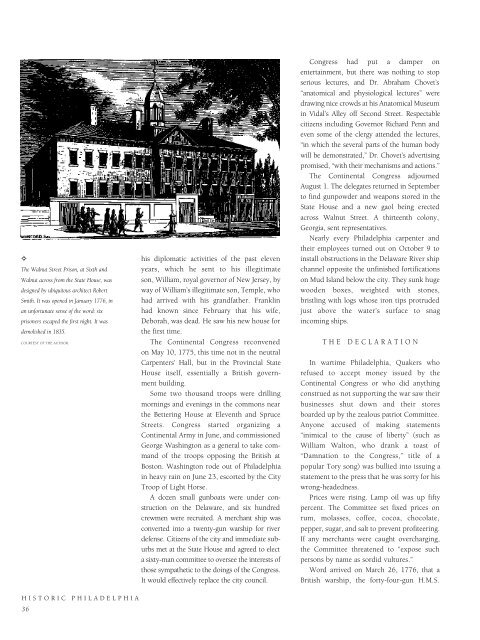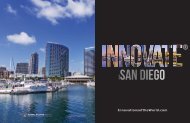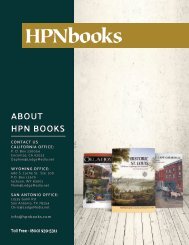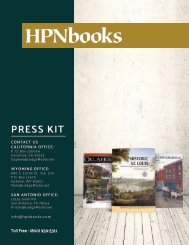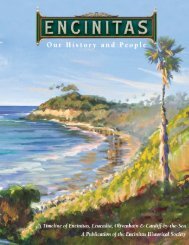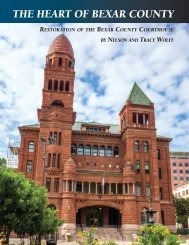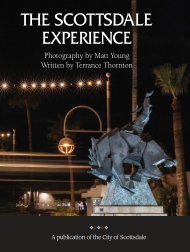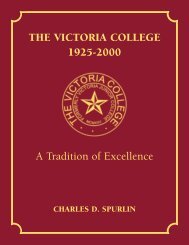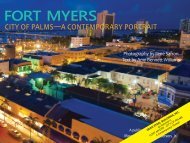Historic Philadelphia
An illustrated history of the city of Philadelphia, paired with the histories of companies, families and organizations that make the region great.
An illustrated history of the city of Philadelphia, paired with the histories of companies, families and organizations that make the region great.
Create successful ePaper yourself
Turn your PDF publications into a flip-book with our unique Google optimized e-Paper software.
✧<br />
The Walnut Street Prison, at Sixth and<br />
Walnut across from the State House, was<br />
designed by ubiquitous architect Robert<br />
Smith. It was opened in January 1776, in<br />
an unfortunate sense of the word: six<br />
prisoners escaped the first night. It was<br />
demolished in 1835.<br />
COURTESY OF THE AUTHOR.<br />
HISTORIC PHILADELPHIA<br />
36<br />
his diplomatic activities of the past eleven<br />
years, which he sent to his illegitimate<br />
son, William, royal governor of New Jersey, by<br />
way of William’s illegitimate son, Temple, who<br />
had arrived with his grandfather. Franklin<br />
had known since February that his wife,<br />
Deborah, was dead. He saw his new house for<br />
the first time.<br />
The Continental Congress reconvened<br />
on May 10, 1775, this time not in the neutral<br />
Carpenters’ Hall, but in the Provincial State<br />
House itself, essentially a British government<br />
building.<br />
Some two thousand troops were drilling<br />
mornings and evenings in the commons near<br />
the Bettering House at Eleventh and Spruce<br />
Streets. Congress started organizing a<br />
Continental Army in June, and commissioned<br />
George Washington as a general to take command<br />
of the troops opposing the British at<br />
Boston. Washington rode out of <strong>Philadelphia</strong><br />
in heavy rain on June 23, escorted by the City<br />
Troop of Light Horse.<br />
A dozen small gunboats were under construction<br />
on the Delaware, and six hundred<br />
crewmen were recruited. A merchant ship was<br />
converted into a twenty-gun warship for river<br />
defense. Citizens of the city and immediate suburbs<br />
met at the State House and agreed to elect<br />
a sixty-man committee to oversee the interests of<br />
those sympathetic to the doings of the Congress.<br />
It would effectively replace the city council.<br />
Congress had put a damper on<br />
entertainment, but there was nothing to stop<br />
serious lectures, and Dr. Abraham Chovet’s<br />
“anatomical and physiological lectures” were<br />
drawing nice crowds at his Anatomical Museum<br />
in Vidal’s Alley off Second Street. Respectable<br />
citizens including Governor Richard Penn and<br />
even some of the clergy attended the lectures,<br />
“in which the several parts of the human body<br />
will be demonstrated,” Dr. Chovet’s advertising<br />
promised, “with their mechanisms and actions.”<br />
The Continental Congress adjourned<br />
August 1. The delegates returned in September<br />
to find gunpowder and weapons stored in the<br />
State House and a new gaol being erected<br />
across Walnut Street. A thirteenth colony,<br />
Georgia, sent representatives.<br />
Nearly every <strong>Philadelphia</strong> carpenter and<br />
their employees turned out on October 9 to<br />
install obstructions in the Delaware River ship<br />
channel opposite the unfinished fortifications<br />
on Mud Island below the city. They sunk huge<br />
wooden boxes, weighted with stones,<br />
bristling with logs whose iron tips protruded<br />
just above the water’s surface to snag<br />
incoming ships.<br />
THE<br />
DECLARATION<br />
In wartime <strong>Philadelphia</strong>, Quakers who<br />
refused to accept money issued by the<br />
Continental Congress or who did anything<br />
construed as not supporting the war saw their<br />
businesses shut down and their stores<br />
boarded up by the zealous patriot Committee.<br />
Anyone accused of making statements<br />
“inimical to the cause of liberty” (such as<br />
William Walton, who drank a toast of<br />
“Damnation to the Congress,” title of a<br />
popular Tory song) was bullied into issuing a<br />
statement to the press that he was sorry for his<br />
wrong-headedness.<br />
Prices were rising. Lamp oil was up fifty<br />
percent. The Committee set fixed prices on<br />
rum, molasses, coffee, cocoa, chocolate,<br />
pepper, sugar, and salt to prevent profiteering.<br />
If any merchants were caught overcharging,<br />
the Committee threatened to “expose such<br />
persons by name as sordid vultures.”<br />
Word arrived on March 26, 1776, that a<br />
British warship, the forty-four-gun H.M.S.


